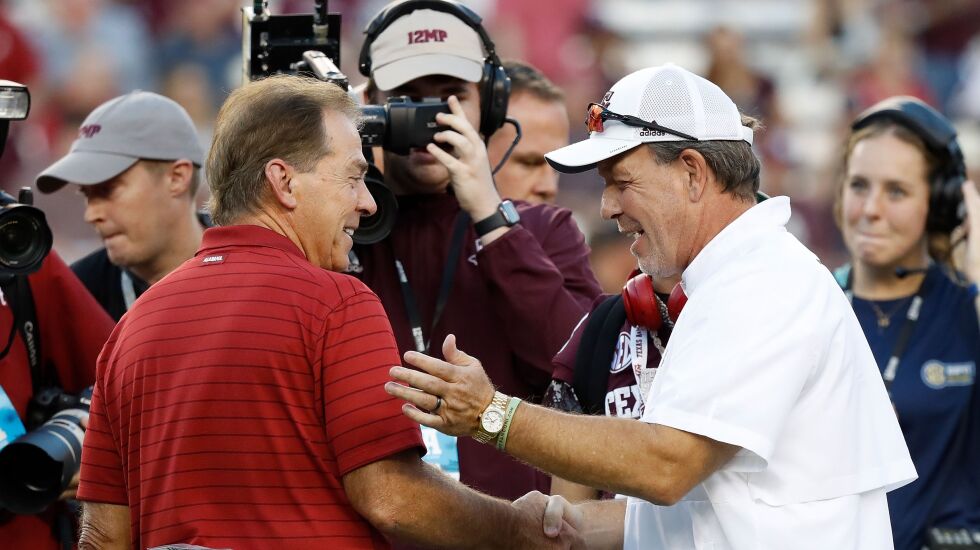
Alabama coach Nick Saban says Texas A&M “bought’’ its talented 2022 recruiting class, leading Aggies coach Jimbo Fisher to call Saban “despicable,’’ causing Saban to respond with something along the lines of “am not” and … well, what did you expect? That college players finally getting paid for their talents would go well?
I’ve long been a proponent of “student-athletes” being compensated above board, but I’ve never been under the impression that it would be anything other than “Jurassic Park’’ when the money started flowing. You thought you were going to warm up the DNA from some T. rexes and their large, pointy, dripping teeth would behave?
Now that college athletes can get paid handsomely for their name, image and likeness (NIL), famous coaches don’t know how to handle it. In the good old days, a school booster surreptitiously handed a kid a bagful of money to do with as he pleased, and his coach could rationalize that neither he nor the university shelled out anything other than free tuition. The haves — the schools with the stellar football and basketball teams — smiled, and the have-nots wondered what an institution of high learning such as theirs had to do to get some alumni who were billionaire venture capitalists.
When the NCAA finally allowed athletes to sell their NILs to the highest bidder last year, it meant that the athletes had lassoed some control. And no one on earth likes total control more than your typical college football coach, whose best friends are an incredibly detailed schedule and the second hand on a clock. Coaches are so meticulous and so obsessive that anything that stands outside the lines they have painstakingly drawn are considered dangerous and subversive.
Saban has won six national titles at Alabama, usually has the top recruiting class in the country and sends more players to the NFL than anyone else. This year, Texas A&M had the consensus No. 1 recruiting class, which apparently hacked off Saban so much he declared that the Aggies had “bought every player’’ in their esteemed recruiting class.
I believe two things: 1) that, despite his later protestations, Saban meant exactly what he said about A&M buying players and 2) that he sees a new world approaching that won’t necessarily allow him to dominate the way he has. He’s the king of this one. Why would he want change?
“I’m not against NIL,’’ he said. “I’m against bidding for high school players. I’m against attorneys, collectives and others getting between the money and the players. Is that really what we want it to be in college football?”
Oh, please.
It would take an incredibly naive person — I’m thinking Forrest Gump levels here — to believe that the top programs weren’t illicitly paying off players before NILs arrived a year ago. But not every alum with money was corrupt. Some might have wanted their school to be great at football or basketball but didn’t have the stomach for a recruiting scandal involving their name, photo and place of business becoming public. NILs — corporate sponsorships, revenue from autographs, etc. — not only allow athletes to be paid overtly for their skills, it allows more alumni to give money without the taint of wrongdoing.
What Saban surely knows is that NILs will level the playing field a bit. He says he doesn’t want middlemen siphoning some of the money meant for the athletes, but he has to know that’s a con job. There have always been street agents getting a piece of recruits’ dirty money, the money that comes from boosters — the boosters who work back channels and alleys for the schools. What Saban really doesn’t like is the lack of control. He understood a loose, secretive system. He doesn’t understand this one. Or maybe he understands it too well.
He sees players getting paid a lot of money, which means he sees wealthy players who might not respond to a coach’s scare tactics anymore. He sees other schools offering NIL opportunities that might match Alabama’s. He doesn’t like what he sees.
So he said what he said about Texas A&M and the evil byproducts of NILs, leading Fisher to say what he said about Saban and … well, what did you expect? With an annual salary of about $10 million, Saban is the highest-paid college football coach in the country. There’s a reason for that. He regularly gets more of the best high school football players than anybody else.
But not this year, and he doesn’t like it. He also doesn’t like the idea of bidding wars for “student-athletes” and the idea of pliant, impressionable players not being so pliant and impressionable anymore, thanks to the big money that NILs can bring.
It’s not easy being the king, especially now that kids can get a king’s ransom from somebody else.







